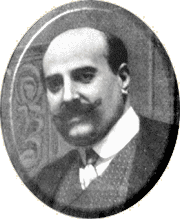André Wormser

André Alphonse Toussaint Wormser (1 November 1851 – 4 November 1926) was a French banker and Romantic composer.
Life and career
André Wormser was born in Paris and studied with Antoine Marmontel and François Bazin at the Paris Conservatoire.[1] He married Olga née Boris, and the couple had four children, Diane, Sabine, Dominique and Olivier, all featured in a 1926 portrait Madame André Wormser and her Children by Édouard Vuillard.[2] As a very wealthy man, Wormser was able to afford a membership in the social club Cercle artistique et littéraire.[3]
In 1872 Wormser won the Premier Prix in piano at the Paris Conservatoire,[4] and in 1875 he won the Prix de Rome for his cantata Clytemnestre. He is best known for the pantomime L'Enfant prodigue (1890),[5] which was revived at the Booth Theater in New York in 1916 as the three-act play Perroit the Prodigal.[6] He died in Paris.
Notable students include Charles Malherbe.
Works

Wormser composed choral and orchestra music, opera and works for solo instrument and voice. Selected works include:
- L'Étoile, Ballet-pantomime en deux actes (31 May 1897, chor. Joseph Hansen, Paris Opera)
- Ballada for Oboe and Piano (1909)
- Clytemnestre, cantata (1897)
- L'Enfant prodigue, pantomime (1916)
- Rêverie (Gypsy Suite) for violin and piano
- Adèle de Ponthière, opera (1887)
- Rivoli, opera (1896)
References
- ↑ "Wormser, Andre Alphonse". Retrieved 23 February 2012.
- ↑ "Madame André Wormser and her Children". Retrieved 23 February 2012.
- ↑ Smith, Richard Langham; Potter, Caroline (2006). French music since Berlioz.
- ↑ Margell, Tad. "The Paris Conservatoire Concours Oboe Solos:The Gillet Years (1882-1919)" (PDF). IDRS Journal. Retrieved 23 February 2012.
- ↑ "Wormser, André". Retrieved 23 February 2012.
- ↑ "Pierrot the Prodigal". Retrieved 23 February 2012.
External links
- Works by or about André Wormser at Internet Archive
- Free scores by André Wormser at the International Music Score Library Project (IMSLP)
- André Wormser at AllMusic
- André Wormser : Romance sans paroles, #4 from '6 Pieces Pittoresques' from YouTube